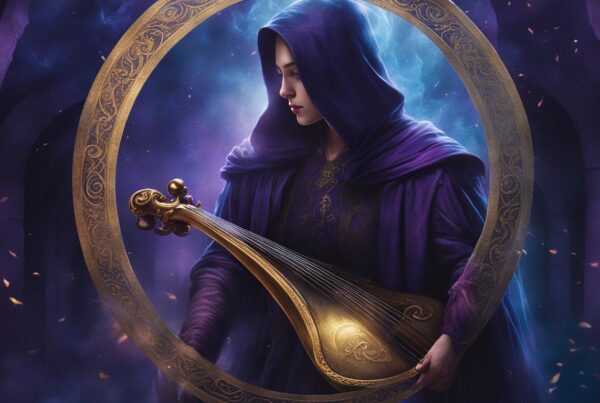When Vikram Chandra penned “Sacred Games”, little did he know that his expansive Mumbai noir narrative would not only captivate readers but also audiobook listeners with its rich storytelling and intricate criminal entanglements. This audiobook critique dives into the heart of Mumbai’s underworld through our in-depth “Sacred Games” review. In this audio journey, the quintessential elements of a gripping crime thriller audiobook are brought to life, offering an immersive experience that goes beyond the printed words.
Chandra’s “Sacred Games” is a compelling masterclass in narrative fiction, marrying the charm of Indian literary prowess with the gritty, raw underbelly of Mumbai. This review seeks not just to appraise the work’s literary merit but also to scrutinize the efficacy of its transformation into an audio format. As we traverse through this bedlam of power and survival, we unveil how an audiobook can redefine the absorption of storytelling.
Unveiling “Sacred Games”: A Modern Thriller Masterpiece
Sacred Games, a linchpin of Indian literary fiction, encapsulates the grit and enigma that define the modern thriller. With its penetrating insight into the Mumbai underworld tale, it transmutes the vibrancy and chaos of the city into an epic crime saga. This narrative is at once categorical and enthralling, pinning readers to the edge of their seats.
- Narrative Style: The book’s omniscient narration folds time and space, delving into the complex psyche of its characters while pacing the story with precision.
- Mumbai Depiction: More than a mere backdrop, Mumbai thrives within the pages, its labyrinthine streets narrating a tale of power, ambition, and survival.
- Engaging Pacing: Vikram Chandra’s expertise in pacing knits together diverse storylines, maintaining suspense and building momentum.
- Character Complexity: Unraveling the layers of the city’s outcasts and stakeholders, the book reveals the intertwined fates of the virtuous and the notorious.
Vikram Chandra’s Sacred Games champions a narrative style that eschews the linear for a profound tapestry, which mirrors the unpredictable beat of Mumbai itself. It is the very embodiment of the modern thriller—a genre defined by its capacity to unsettle and astonish.
“In every moment of its substance, Sacred Games exudes the makings of a modern thriller—a confluence of character and city that unravels narratives as diverse and dynamic as India itself.”
Readers are tethered to an experience that sears with authenticity, resonating long after the final page turns. As a milestone of Indian literary fiction, it not only recounts an epic crime saga but immortalizes the essence of Mumbai, transforming it from a mere metropolis into a central character that molds the destiny of each individual ensnared in its tale. The result is a piercing exploration of the human condition set against the ceaseless hum of an insomniac city.
Discovering Vikram Chandra: Literary Journey and Inspirations
Delving into the life of Vikram Chandra, an author whose works resound with the depth of Indian contemporary literature, reveals a tapestry woven with strands of rich narrative storytelling and profound authorial inspiration. His journey as a writer encapsulates a unique blend of cultural experiences and literary influences, shaping what would become one of his most acclaimed contributions to modern literature, “Sacred Games”.
Influences and Experiences Shaping “Sacred Games”
Chandra’s path to writing “Sacred Games” was carved by an immersion in diverse environments, ranging from his education in India and the United States to the pulsating life of Mumbai, the city that would form the heart of his epic narrative. His flair for crafting intricate plots is a testament to his exposure to the multilayered stories from his homeland, as well as his explorations into the realm of computer programming, which he seamlessly integrates into his writing process.
How “Sacred Games” Stands in the Pantheon of Chandra’s Work
“Sacred Games” is not merely another addition to Vikram Chandra’s oeuvre; it is a pivotal work that encapsulates his growth and exploration as a writer. Standing out for its ambitious scope and the intricate interplay of crime and morality, the novel has etched its place firmly within the domain of Indian contemporary literature. Chandra’s take on Mumbai’s underbelly is not just about presenting the city’s clandestine activities but about offering a mirror to society through powerful story arcs, which have become a hallmark of his authorial identity.
The Heart of Mumbai: A Character in Its Own Right
When one immerses into Vikram Chandra’s “Sacred Games”, it becomes evident that the Mumbai setting is masterfully rendered, not just as a backdrop but as a vital, character-driven narrative entity. The sprawling metropolis, with its cacophony of sounds, vibrant colors, and teeming multitudes, pulsates with life, shaping the destiny of Chandra’s characters in profound ways. This literary depiction of Mumbai entwines with the plot, becoming as crucial as the characters themselves—a city as protagonist.
The essence of Mumbai, captured within the pages of “Sacred Games”, brings forth the contrasts of richness and squalor, tradition and modernity, which define the city’s unique character. To understand the depth of this relationship between the city and its inhabitants, consider the network of local trains, often regarded as Mumbai’s lifelines, that carry the shared hopes and sorrows of millions every day. The portrayal of these lifelines in Chandra’s narrative serves as a metaphor for the interconnected fates of those dwelling within.
| Mumbai’s Aspect | Role in Narrative | Impact on Characters |
|---|---|---|
| Chaotic Streets | Setting for key plot developments | Characters’ resilience mirrors city’s relentless pace |
| Local Trains | Metaphor for life’s journey | Highlights characters’ aspirations and struggles |
| Monsoon Rains | Backdrop for emotional crescendos | Reflects characters’ tumultuous inner states |
| Bollywood’s Glitz | Represents the city’s dream factory | Embodies characters’ search for identity and escape |
As an evocative literary depiction of Mumbai, “Sacred Games” attests to the power of setting in storytelling. The city’s vastness and vitality compel the characters to navigate through its layers, just as the city itself moves inexorably forward, ensnaring them in its rhythm. Here, Mumbai is not merely a city; it is a narrative force that propels the characters toward their destinies, enmeshed in the urban tapestry of Chandra’s compelling tale.
Navigating the Complex Plot of “Sacred Games”
The narrative labyrinth within Vikram Chandra’s “Sacred Games” showcases a masterly blend of plot complexity and intricate thematic analysis. As readers delve deeper into the heart of Mumbai’s criminal underworld, they encounter a chessboard of power dynamics and existential dilemmas, revealing the depth of character development that grounds this epic tale.
Dissecting Themes of Power, Spirituality, and Redemption
In “Sacred Games”, power is not just a tool for character progression; it’s a thematic force that shapes every twist and turn of the plot. Chandra’s Mumbai is a microcosm where power flows through every strata of society, often juxtaposed with undercurrents of spirituality and a longing for redemption. The thematic analysis involves peeling back the layers to understand how these themes are interwoven with the city’s psyche, as well as the souls of the characters inhabiting it.
The Depth of Character Arcs in “Sacred Games”
Character arcs within “Sacred Games” are crafted with meticulous detail, elevating the story beyond a conventional crime thriller. Each character’s journey is intimately tied to Mumbai’s pulsating rhythm, their personal evolutions reflecting broader social commentaries on corruption, justice, and morality. By charting their development, one gains a panoramic view of human resilience in the face of overwhelming odds.
| Character | Core Struggle | Evolution |
|---|---|---|
| Sartaj Singh | Moral Dilemma | From compliance to rebellion against systemic corruption |
| Ganesh Gaitonde | Quest for Power | From ruthless gangster to introspective seeker |
| Anjali Mathur | Search for Truth | Challenges gender norms to unravel Mumbai’s crime web |
| Iftikhar | Survival | Depicts the harsh realities of working-class struggles in Mumbai |
As the narrative of “Sacred Games” weaves through the alleys of power and subjugation, it also scales the heights of existentialism, creating an unforgettable odyssey through Mumbai’s underbelly. The characters, with their unique arcs, serve not only as pawns in a larger game but also as pillars upholding a story that is unyielding in its depth.
The Audiobook Experience: A New Perspective on “Sacred Games”
The transition of “Sacred Games” from text to audiobook offers an entirely unique avenue through which enthusiasts can experience Vikram Chandra’s rich tapestry of Mumbai’s underworld. This auditory journey elevates the narrative, infusing it with dimensions that are not as readily apparent in the printed word. At the heart of this sensory expansion lies the audiobook performance which, due to the efforts of accomplished narrators, goes beyond mere reading to become a compelling act of storytelling.
Assessing the Performance: Voice Acting and Authenticity
The power of an audiobook is largely dependent on the voice acting quality of its narrator. It’s more than just clarity of speech or pacing; it’s about the embodiment of characters, the authentic portrayal of emotions, and the ability to transport the listener to the center of the action. “Sacred Games” gains an immersive edge through the narrators’ skill in delivering realistic accents and dialects, thereby lending an additional layer of authenticity to the Mumbai setting.
Soundscapes and Audio Quality
An immersive audiobook experience is an intricate blend of voice artistry and technical prowess. The audio quality—comprising clear sound production, mixing, and soundscaping—plays a significant role in creating a believable and absorbing world. The immersive experience of “Sacred Games” is further accentuated by background scores and effects that mirror the intensity and mood of the narrative, ensuring a seamless and captivating listening experience.
| Aspect | Details |
|---|---|
| Characterization | Narrators employ diverse voices and intonations to represent various characters, enhancing the understanding of their personalities and motives. |
| Authenticity | Use of authentic Mumbai slang and measured delivery to capture the essence of the locale and its people. |
| Sound Quality | High-fidelity recording with attention to acoustics, ensuring clarity and enriching the audiobook’s ambience. |
| Emotional Delivery | Emotional resonance through tone and pace, enabling listeners to connect with the story’s underlying themes of power and redemption. |
“Sacred Games”: Beyond the Pages
The audiobook adaptation of Vikram Chandra’s “Sacred Games” represents a significant shift in the literature to audio transition, reflecting an expanded narrative experience that extends well beyond the written word. When a text as rich as “Sacred Games” is brought to the audio realm, it inherits a new life—a soundscape that can enhance the listener’s immersion into Mumbai’s dense atmosphere.

Audiobooks offer a unique form of storytelling that can add layers of complexity and emotion through the use of voice. A seasoned narrator brings out nuances in dialogue and narrative descriptions that may go unnoticed in the text, bridging the gap between the author’s intent and the audience’s reception.
| Feature | Literature | Audiobook |
|---|---|---|
| Narrative Delivery | Personal interpretation through reading | Voice actor conveying emotion and tension |
| Accessibility | Requires time and space to read | Convenient listening on-the-go |
| Engagement | Imagination based on text | Immersive audio that prompts visual imagery |
| Pacing | Controlled by the reader | Established by the narrative rhythm |
This adaptation further enriches the experience by enabling listeners to explore the accents and local dialects potent in Chandra’s world through skilled voice actors, thus making the literature to audio transition a conduit to a richer understanding of the cultural backdrop of the story.
Overall, the journey of “Sacred Games” from literature to audio has amplified the saga, offering listeners an expanded narrative experience poised to captivate the imagination in a way that only audio can achieve.
“Sacred Games” Audiobook Review: Listener Reactions and Critiques
The audiobook adaptation of Vikram Chandra’s “Sacred Games” has elicited a rich tapestry of listener reviews, each contributing to a collective understanding of the audiobook reception. The narrative impact of the story in its auditory format has sparked diverse audience feedback, affirming the importance of both content and medium in literary appreciation.
Avid listeners have taken to various platforms to express their opinions on the audiobook, highlighting the adept narration that adds a nuanced layer of engagement to Chandra’s already compelling tale. Reflections abound on the voice acting, with many reviews pointing to the authenticity and vitality it brings to the bustling streets of Mumbai, effectively transforming the city into a pulsating character.
To systematically convey the spectrum of responses, a compilation of listener critiques has been curated below, showcasing the consensus on key elements of the audiobook experience.
| Aspect | Positive Feedback | Constructive Critiques |
|---|---|---|
| Narration Quality | Engaging and vibrant, enhancing the storyline | Occasionally fast-paced, difficult for non-native listeners |
| Audio Production | Immersive soundscape that captures Mumbai’s essence | Some chapters have inconsistent volume levels |
| Character Portrayal | Dynamic and convincing voice characterization | Pronunciation issues with some local terms |
| Plot Execution | Retains the complexity and depth of the novel | Challenging to follow for listeners unfamiliar with the story |
The collective audience feedback underscores the profound narrative impact of “Sacred Games” as an audiobook. It offers a unique literary avenue for existing fans and newcomers alike, demonstrating the elasticity of storytelling across formats. In conclusion, the listener reviews serve as a valuable metric for assessing the overall audiobook reception, signifying the successful auditory reincarnation of Vikram Chandra’s Mumbai noir.
From Book to Screen: Comparing “Sacred Games” Adaptations
Translating the rich tapestry of “Sacred Games” from the written word to a visual medium presents both challenges and opportunities. A book-to-screen adaptation involves a meticulous blend of visual storytelling, comparative analysis, and an evaluation of actor performance, each aspect critically shaping how the story is perceived by a new audience. The complexity and depth of such an adaptation offer a fascinating case study in narrative transformation.
The Impact of Visuals on the Story’s Interpretation
Visual storytelling brings with it the power to alter audience perception through imagery, creating a visceral experience of Mumbai’s dark underbelly that the pages only hint at. The interplay of light and shadow, the selection of scenes, and the actors’ embodiment of characters—all contribute to an immersive visual narrative that can greatly enhance or sometimes diverge from the original literary vision.
Comparing Narrative Delivery: Screen Actors vs Narrator
Comparing the book to its screen adaptation, we notice a shift in the narrative delivery. The actor’s performance adds a tangible layer of depth to characters that is distinct from the internal monologues found in the audiobook. Understanding how each actor interprets their character is crucial in evaluating the transition from a narrated story to one that is acted out.
Following is an in-depth comparative analysis of key adaptations:
| Element | Audiobook | Screen Adaptation |
|---|---|---|
| Character Depth | Insights through inner monologues and detailed descriptions | Actor’s portrayal and physicality bring characters to life |
| Story Pacing | Consistent with the book, allowing for in-depth contemplation | Edited for dramatic effect, can differ from the book’s rhythm |
| Themes and Symbolism | Explained via narrator, reliant on listener’s imagination | Visual cues and settings reinforce themes |
| Engagement Level | Dependent on listener’s focus, influenced by voice performance | Engages through compelling visuals and actor’s chemistry |
In the final analysis, each adaptation, whether through audiobook narration or actor performance on screen, showcases the power and malleability of “Sacred Games'” storytelling. Through this comparative study, we gain insight into the multi-dimensional approach to narrative interpretation, highlighting the unique and resonant impact “Sacred Games” has had across different mediums.
Critical Examination: The Layers of “Sacred Games”
The intricate tapestry of Vikram Chandra’s “Sacred Games” is not just another narrative; it is a masterpiece that weaves together complex characters and a pulsating city with finesse. The narrative structure of this literary giant does not merely tell a story—it plunges readers into the depths of Mumbai’s soul. This section will explore the various facets of the novel’s construction and its layered storytelling, analyzing how these elements contribute to the work’s literary significance and enduring appeal.
Chandra’s magnum opus is an exemplar of critical analysis within literature, where every subplot and character is meticulously crafted, contributing to a greater understanding of the human condition and societal machinations. It is this layered complexity that invites readers to delve beyond the surface, uncovering truths about corruption, power, and redemption that are as relevant in today’s world as they are in the book’s setting. The narrative intricacy mirrors the chaotic, intertwined lives and fates of the characters, demonstrated through a labyrinthine plot that demands attention and rewards careful study.

At the core of “Sacred Games” lies a deeply embedded network of themes and motifs, each thread essential to the overall fabric of the tale. Layered storytelling not only serves to engage readers but also to pose significant questions about morality, the impacts of colonialism, and the cycles of violence that beleaguer societies. The novel’s ability to interlace personal dramas with the larger narrative of Mumbai as an entity showcases its remarkable narrative structure.
“To say that ‘Sacred Games’ is a mere crime novel is to do it a disservice. It transcends genre, becoming a study of power and its transformation.” — Vikram Chandra
Furthermore, a closer inspection of the language and metaphorical richness reveals Chandra’s command over the medium, infusing literary significance into each sentence. His prose is not only a medium for storytelling but also a vehicle for cultural and philosophical inquiry—making “Sacred Games” a quintessential read in the genre of Indian English literature.
Through critical analysis, one can appreciate the interplay of language, culture, and narrative. It is the confluence of these streams that marks “Sacred Games” not just a compelling read but an important cultural artifact that continues to offer insights with each re-reading. The novel’s reception and critique stand testimony to its sophisticated design and enduring impact.
To conclude, the dissection of “Sacred Games” through the lens of its narrative structure and layered storytelling unearth a treasure trove of insights, ensuring its place in the annals of literary classics. It is the amalgamation of a rigorously structured plot, multifaceted characters, and a vibrant setting that cements the novel’s status as a tour de force in modern literature.
If You Liked “Sacred Games”: Recommendations for Your Next Audiobook
For fans of the gripping underworld narratives portrayed in “Sacred Games”, the good news is that there are plenty of audiobook suggestions waiting for you. Whether you’re intrigued by the complex characters, the vibrant yet dark depiction of Mumbai, or the thrilling twists of the plot, the following list is a carefully curated reading list, designed to match your tastes to similar genres.
These selections include some of the best in crime and thriller audiobooks, featuring stories rich in suspense, mystery, and dramatic tension. From the chilling cold of Scandinavian noir to the sweltering streets of L.A. detective tales, this collection promises riveting listening experiences for aficionados of the genre.
- “The Girl with the Dragon Tattoo” by Stieg Larsson – A chilling thriller from Sweden that blends mystery, family saga, and financial intrigue into a captivating narrative.
- “Gone Girl” by Gillian Flynn – Experience the dark twists of this modern psychological thriller that questions the realities of marriage and media influence.
- “I Am Pilgrim” by Terry Hayes – Dive into a complex web of espionage with a thriller that spans nations and dives deep into a world of clandestine operations.
- “In the Woods” by Tana French – Join the Dublin Murder Squad in this intricate, character-driven tale as detectives navigate a convoluted crime linked to the past.
- “The Silkworm” by Robert Galbraith (J.K. Rowling) – Follow the enigmatic private investigator Cormoran Strike as he unravels the twisted death of a novelist.
If you’re enveloped by the shadowy realms of these stories, remember that a powerful narrative can transport you to worlds both thrilling and unexpected. Continue exploring, listening, and indulging your taste for finely-woven tales of suspense and intrigue.
Conclusion
Having journeyed through the labyrinthine alleys of Mumbai’s noir narrative, our comprehensive review finds itself at a crucial juncture, ready to impart final thoughts and render a literary evaluation. “Sacred Games” by Vikram Chandra possesses a gravitas shaped by a complex intertwining of characters and a rich backdrop that transcends the conventions of its genre.
Summing Up the Intricate World of “Sacred Games”
In this audiobook, Mumbai’s vibrant pulse echoes in the listener’s ears, serving as both a canvas and a catalyst for the plot’s unfolding. Each character’s arc is meticulously crafted, imbued with themes of power, spirituality, and morality. The performance in the audio rendition adds an additional layer of authenticity, bringing the story to life through a masterful display of voice acting and immersive soundscapes.
Is the “Sacred Games” Audiobook Worth Your Time?
When making the audiobook verdict, it’s clear that this auditory experience elevates the source material, thus proving itself a worthy investment for enthusiastic listeners. Whether you’re a devotee of detailed character exploration or a connoisseur of intricate crime sagas, “Sacred Games” stands out as an exemplar of its kind. For those seeking a narrative that captures the essence of a city and its underworld, this audiobook will not just occupy your time, but will command your attention, delivering an unforgettable plunge into the depths of a literary masterpiece.



